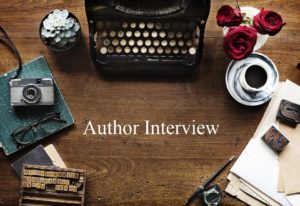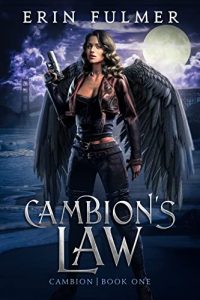An Interview with Erin Fulmer
 Like most of the authors I interview, 2021 Debuts author Erin Fulmer leads two lives. By day she’s a public benefits attorney, and by night she’s an author of science fiction and urban fantasy who recently saw her debut novel, Cambion’s Law, released from City Owl Press. In this season of gratitude, I’m sure Erin is thrilled with the positive reviews that are already rolling in for her work. One Goodreads reviewer said, “This may be Fulmer’s debut novel, but she’s already a seasoned writer with a well-defined style and voice,” and another wrote, “My favorite kinds of characters are the ones who don’t always make perfect choices but try so hard to do the right thing, even when they aren’t entirely sure what that is.” Which means Erin is writing relatable characters in a way that sticks with the reader. And who can complain about that? As always, Erin leads a full life, and I’m so thankful she took the time to answer my questions.
Like most of the authors I interview, 2021 Debuts author Erin Fulmer leads two lives. By day she’s a public benefits attorney, and by night she’s an author of science fiction and urban fantasy who recently saw her debut novel, Cambion’s Law, released from City Owl Press. In this season of gratitude, I’m sure Erin is thrilled with the positive reviews that are already rolling in for her work. One Goodreads reviewer said, “This may be Fulmer’s debut novel, but she’s already a seasoned writer with a well-defined style and voice,” and another wrote, “My favorite kinds of characters are the ones who don’t always make perfect choices but try so hard to do the right thing, even when they aren’t entirely sure what that is.” Which means Erin is writing relatable characters in a way that sticks with the reader. And who can complain about that? As always, Erin leads a full life, and I’m so thankful she took the time to answer my questions.
Christina: Congrats on the publication of Cambion’s Law! On Instagram, you wrote that it’s a “book about facing off with your demons (real and metaphorical).” Where did the idea for the novel come from? Did you face any demons while writing the book?
Erin: Thank you so much! I love urban fantasy and always wanted to write my own take on the genre. But in choosing a conflicted half-succubus as my main character, I ended up writing about a journey from an unequal and coercive model of sexuality into more healthy sexual empowerment. My characters think and talk about consent quite a bit and my main character grapples with the ethical responsibilities of giving (and receiving) meaningful consent. For Lily, touch is a superpower, but with great power comes great responsibility—and also a hefty amount of vulnerability. She craves connection and intimacy but the connection she needs is very fraught and even dangerous for both her and her partners. I also wrote and revised the book during a time when the Me Too movement was gaining steam, and it shows. I was definitely facing off with some personal and cultural trauma demons while writing.
Christina: Your work falls into the science fiction, fantasy, speculative fiction realm, and you’ve written specifically about your love for the urban fantasy subgenre. What about this overall genre appeals to you? What do you feel you can do as a writer with the genre that perhaps you could not do with another genre?
Erin: I love urban fantasy because it brings magic into the real world. The idea that the supernatural and mysterious underlies our mundane experience has always appealed to me. Supernatural forces also make for powerful metaphors and symbols that elevate our everyday struggles into the realm of the mythical. Since my main character is an attorney, she deals with the nitty gritty and real shortcomings of the justice system, but she also has the power to really take justice into her own hands—which is far more than most of us have. That’s a power fantasy and one that I think is a particularly feminine power fantasy. To me, it’s important for those to exist, since SFF has been a historically male-dominated space, and there’s something special about grounding that fantasy in a world that looks familiar to us.
Christina: In a recent blog post on urban fantasy, you talk about queer monsters needing love too, and that your main character, Lily Knight, “struggles to feel human” for many reasons, only one of which is her sexuality. How did you capture Lily’s struggle on the page? Did you ever feel overwhelmed by everything you wanted to bring to life with her character?
Erin: As a half-demon, Lily feels she doesn’t fully belong to the human world or the supernatural world. Her arc over the course of the book has a lot to do with integrating her identities and coming to terms with her full self, and part of that in-between space is expressed in her sexuality. Lily doesn’t identify herself explicitly as bisexual, but she does experience bisexual and biromantic desire. She pursues a sexual relationship with men in this book, but she also has a very important and not entirely platonic relationship with her best friend, a woman—and she struggles with how to draw the line in that relationship. I came out as bisexual relatively late in life, so that struggle is a personally meaningful aspect of the character to me, but getting it right can feel overwhelming. As a queer woman writer who is married to a man, representation is definitely always a weight on my mind and I often worry about my characters (and myself) not being queer enough, which is probably the quintessential bisexual experience. It’s something I am looking forward to exploring more in future books.
Christina: You’re a pretty active blogger. How do you decide what to blog about? Are you as particular about your blogging as you might be about your novels? Is there any topic you won’t blog about?
Erin: I tend to blog about whatever is occupying my mind or my creative process at the time. It’s a pretty organic process for me—I’m not one of those organized pro bloggers who drafts posts well in advance or selects topics based on SEO. My posts generally develop over the course of a week or two as I collect my thoughts on a specific topic, and when I’ve completed the draft, I post it. It’s more like public-facing journaling than novel-writing. I haven’t been great about updating my blog lately because I’ve been too busy and distracted in the lead-up to my book release, but blogging is something I enjoy a lot. I think modern social media suffers for a lack of long form writing and I like deep diving into topics that interest me. But maybe I just feel like that because I’m a novelist and long-winded by nature.
Christina: Your day job is as a legal services lawyer. Was lawyer always on your list of things to become? How does law inform your writing? What’s the greatest lesson you’ve learned from the profession?
Erin: I took a winding career path into law and my path continues to wind as I pursue my writing career! I studied clinical psychology in undergrad and considered becoming a therapist. However, I changed gears to law after I became interested in politics and realized I wanted to be in a position to influence public policy. I get to work toward that now in my day job. I do a lot of advocacy with government agencies to reduce barriers and increase access to justice for poor and marginalized clients, which can be very rewarding and also extremely frustrating. Of course I came into law wanting to change the world, but I think the biggest lesson I’ve learned is that the world isn’t changed in a day or by just one person, but over years and decades by a lot of people working very hard to make small changes in the right direction. My writing also tends to examine themes of justice and in particular the idea that the personal is political. At the end of the day, if you make things better for just one person, that’s a good day. And in my writing, if it connects with just one reader, that’s a good day too.
Christina: We must talk about your cats (because, CATS!). What are their names? Do they feature in your writing? Do you think they help or hinder your writing process?
Erin: I have two cats, two-year-old sisters named Rhaegal and Drogon, after the dragons in Game of Thrones. I did think they were boys when I named them but the GoT dragons canonically have no fixed gender so that worked out. I bottle-raised them from about a week old after a friend found them abandoned and left out in the open overnight. All of my books have at least one opinionated feline in them, so they certainly feature in my writing. As far as helping, Rhaegal is a taskmaster who keeps me on a very strict schedule and Drogon is my self-care guru who lives for afternoon naps. I have had to learn how to type one handed when they demand snuggles RIGHT MEOW, so that probably makes them more of a hindrance, but they are also a joy and basically my children.
Christina: What does literary success look like to you?
Erin: Being published is more success than I thought possible when I started this journey! Of course, there’s always a new goalpost to reach—an agent, a big advance, a sojourn on the New York Times Bestseller List, a Netflix option—but I think right now for me, my vision of literary success is income from my work that justifies a transition to writing full-time. That’s a long way off for me from where I am right now, but it’s good to dream big and have something to work for. For this book, for right now, success means that a non-zero number of people willing to buy the book, read it, and hopefully say nice things about it. That’s living the dream right there!
Erin can be found in multiple places!
Website: https://erinfulmer.com/
Facebook: @ErinFulmerWrites
Instagram: @ErinFulmerWrites
Twitter: @ErinFulmer
Thanks to Erin for agreeing to this interview! If you know of an author who’d like to be featured in an interview (or you are an author who would like to be featured), feel free to leave a comment or email me via my contact page.

